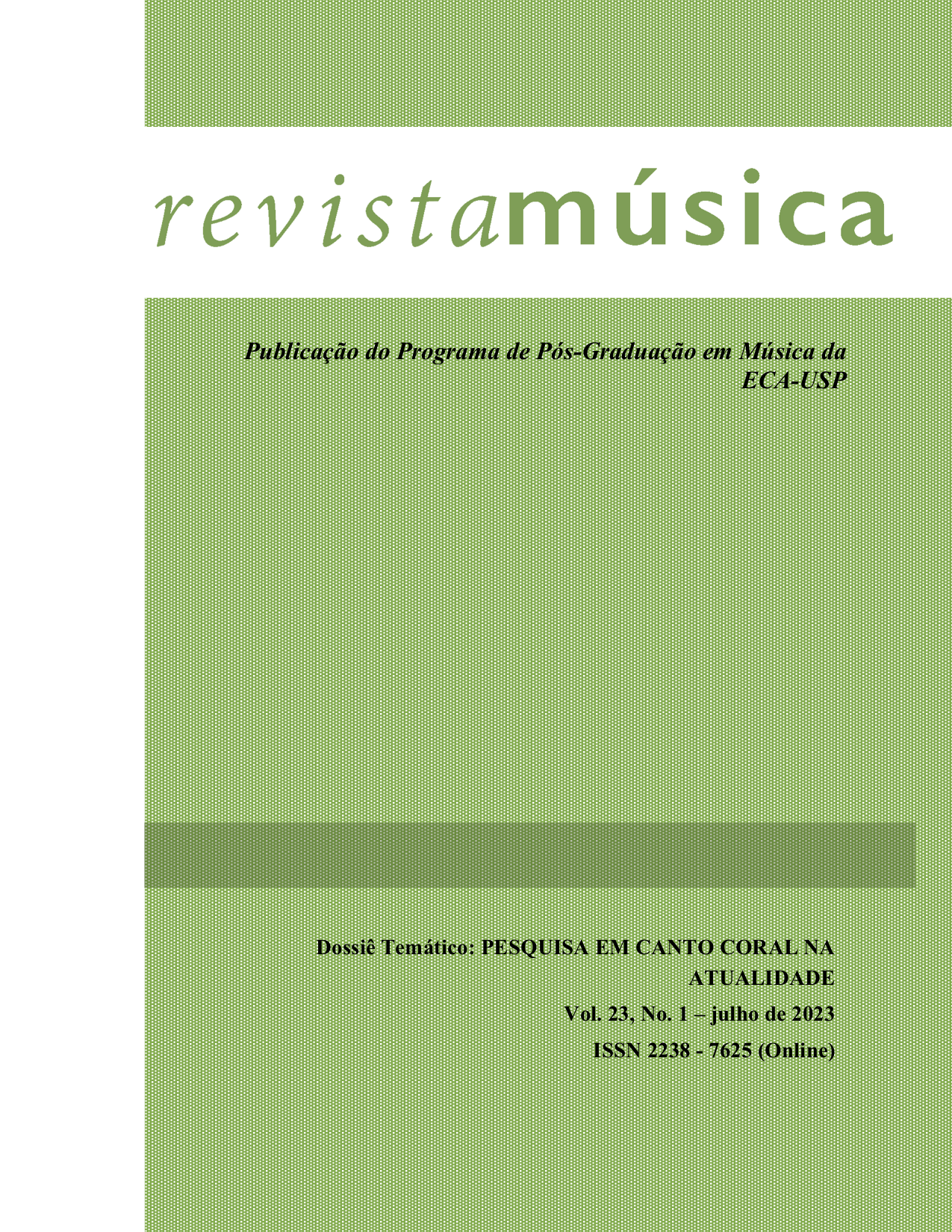On the abundance of things, words and music
DOI:
https://doi.org/10.11606/rm.v23i1.209508Keywords:
Joachim Burmeister, Erasmus of Rotterdam, Musical Poetics, Musical RhetoricAbstract
In 1606, the German musician Joachim Burmeister published his musical poetics in Rostock with the aim of systematizing the musical creative process, constituting didactic material for the Latin school where he worked, disseminating this knowledge and preserving current musical practices. This treatise is recognized for the originality of the systematization it proposes and which initiated a specifically Lutheran tradition of music writing, reading and interpretation, based on the close relationship between poetry and music. For the formulation of this systematization, Burmeister took as a starting point the idea that the space of musical elaboration would be that of the elocutive compositio of the words and that this same elaboration should be proportional to the style of the words, so that the resulting music would contribute to make them more persuasive. In these terms, we can understand that the different musical styles would be characterized, in part, by different poetic styles and, in part, by the particular forms of their musical elaboration, rhetorically codified by the existing treatises. In his Musica Poetica, Burmeister categorized a series of artifices and musical techniques based on the closest and most common references of his time, among which I highlight the De utraque verborum ac rerum copia (1512) by Erasmus of Rotterdam. Just as Erasmus reformulated and updated in his treatise the precepts relating to the abundance of thoughts and words, Burmeister reformulated and updated, for the Lutheran context, the precepts relating to the abundance of musical artifices. In this article, I propose to analyze the relations between Burmeister's and Erasmus' treatises, to investigate the path of ideas that unite them, their similarities and differences, and get to know the foundations of what has been conventionally called musical rhetoric since the 17th century.
Downloads
References
BARROS, Cassiano de Almeida. Fundamentos teológico-políticos da Musica Poetica alemã. Revista Vórtex, [S.l.], v. 8, n. 2, set. 2020. ISSN 2317–9937. Disponível em: <http://periodicos.unespar.edu.br/index.php/vortex/article/view/3816>. Acesso em: 18 Mar. 2023.
BOURDIEU, Pierre. O poder simbólico. Lisboa: Difel, 1989.
BURMEISTER, Joachim. Musica autoschediastike. Rostock: Christophorus Reusnerus,1601. Disponível em <https://digital.staatsbibliothek-berlin.de/werkansicht/?PPN=PPN773029176>. Acesso em 10 Mar 2023.
BURMEISTER, Joachim. Musical Poetics. New Haven & London. Yale University Press, 1993.
BUTT, John. Music Education and the Art of Performance in the German Baroque. Cambridge: Cambridge University Press, 1994.
ERASMO DE ROTERDAM, Desiderio. Recursos de forma y de contenido para enriquecer un discurso [De copia verborum ac rerum]. Madrid: Cátedra, 2011.
FORGÁCS, Robert. Gallus Dressler’s Praecepta musicae poëticae. Urbana and Chicago: University of Illinois Press, 2007.
HANSEN, João Adolfo. Agudezas Seiscentistas e outros Ensaios. São Paulo: Editora da Universidade de São Paulo, 2019.
LOSSIUS, Lucas. Erotemata Dialecticae et Rhetoricae Philippi Melanthonis et Praeceptionum Erasmi Roterodami. Lipsiae: Rhamba, 1569. Disponível em: <https://www.digitale-sammlungen.de/de/view/bsb10192012>. Acesso em: 11 Mar 2023.
LUCAS, Mônica. Imitação de Retóricas Latinas na Concepção de Gêneros e Estilos da Musica Poetica. Revista Música, [S. l.], v. 14, n. 1, p. 129-143, 2014a. DOI: 10.11606/rm.v14i1.115250. Disponível em: https://www.revistas.usp.br/revistamusica/article/view/115250. Acesso em: 18 mar. 2023.
LUCAS, Mônica. Emulação de retóricas clássicas em preceptivas da musica poetica. Opus, Porto Alegre, v. 20, n. 1, p. 71-94, jun. 2014b. Disponível em: https://www.anppom.com.br/revista/index.php/opus/article/view/103. Acesso em: 18 mar. 2023.
LUTERO, Martinho. Preface to Georg Rhau’s Symphoniae Iucundae. In: LEHMANN, Helmut. Luther’s Works – volume 53 – Liturgy and Hymns. Philadelphia: Fortress Press, 1979.
LUTERO. Martinho. Aos Conselhos de Todas as Cidades da Alemanha para que criem e mantenham escolas cristãs. In: LUTERO, Martinho. Obras selecionadas – volume 5. São Leopoldo: Editora Sinodal, 1995. pp. 302-325.
LUTERO, Martinho. Prefácio ao Hinário Wittenberguense de 1524. In: LUTERO, Martinho. Obras Selecionadas – volume 7 – vida em comunidade. São Leopoldo/RS: Editora Sinodal, 2016a. pp. 480-481.
LUTERO, Martinho. Prefácio ao Hinário de Babst de 1545. In: LUTERO, Martinho. Obras Selecionadas – volume 7 – vida em comunidade. São Leopoldo/RS: Editora Sinodal, 2016b. pp. 481-482.
QUINTILIANO, Marcos Fábio. Instituição Oratória - tomo III. Campinas/SP: Editora da Unicamp, 2016.
VORMBAUM, Reinhold (Org.). Die evangelischen Schulordnungen des sechszehnten Jahrhunderts. Gütersloh: C. Bertelsmann, 1860.
Downloads
Published
Issue
Section
License
Copyright (c) 2023 Cassiano de Almeida Barros

This work is licensed under a Creative Commons Attribution-NonCommercial-ShareAlike 4.0 International License.
Autores que publicam nesta revista concordam com os seguintes termos:
- Autores mantém os direitos autorais e concedem à revista o direito de primeira publicação, com o trabalho simultaneamente licenciado sob a CC Attribution-NonCommercial-ShareAlike 4.0 que permite o compartilhamento do trabalho com reconhecimento da autoria e publicação inicial nesta revista.
- Autores têm autorização para assumir contratos adicionais separadamente, para distribuição não-exclusiva da versão do trabalho publicada nesta revista (ex.: publicar em repositório institucional ou como capítulo de livro), com reconhecimento de autoria e publicação inicial nesta revista.
- Autores têm permissão e são estimulados a publicar e distribuir seu trabalho online (ex.: em repositórios institucionais ou na sua página pessoal) a qualquer ponto antes ou durante o processo editorial, já que isso pode gerar alterações produtivas, bem como aumentar o impacto e a citação do trabalho publicado (Veja O Efeito do Acesso Livre).


